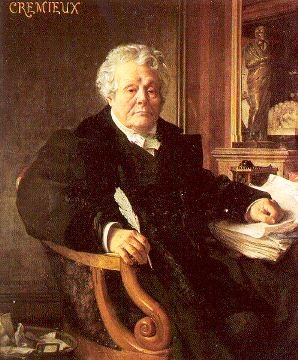
When Carol I of Romania came to power in 1866, a new constitution was introduced that included a clause on giving Jews the right of citizenship. This section of the constitution provoked demonstrations and riots: the Great Synagogue was damaged and looted, Jews were attacked and their stores destroyed. In the end, the clause was removed and the constitution passed, abolishing the previous laws of Prince A.I. Cuza. From then on it was possible to treat Jews as foreigners and to deprive them of Romanian citizenship. Thus, King Carol's administration opened a new era of legal discrimination to a community of 165,000 middle-class people, mainly artisans and merchants.
From 1866 to the War of Independence in 1877, the authorities systematically persecuted the Jews through restrictive laws and regulations. Once again,limitations were imposed on their right to settle and to choose a profession. This time it was Interior Minister, Ion Brătianu, a revolutionary from 1848, who instituted a systematic anti-Jewish policy in the spirit of the Organic laws. In a series of circulars sent to the heads of the provinces in the spring of 1867, he demanded vigorous measures to get rid of the "vagabonds".Following the organic laws, he stated that Jews were no longer allowed to live in, or to hold land or inns in rural areas; they were forbidden to rent agricultural lands, work at professions in teaching, law, pharmacy, medicine, or railway work. They were obliged to serve in the army, without any possibility of becoming officers.
There were about 200,000 Jews living in Romania at the time- most of them in Moldova - and they played an important role in the socio-professional composition of the urban population.
Bratianu's instructions, which were intended to bring about the expulsion of the Jews from the villages, and ultimately, from the country, were carried out faithfully and forcefully by his subordinates.
During this period, protests by Jewish personalities and institutions in the West, as well as by the great powers, increased under the pressure of their Jewish citizens. Moses Montefiore, then 83 years old, traveled to Bucharest to demand an end to the persecution. Brătianu was forced to resign in 1868, but the deportations continued within the anti-Jewish atmosphere; 500 families from the Bacău district were expelled within 24 hours. 'Alliance' published an article about the situation in Parisian newspapers, Le Temps and La Patrie on April 13-14, 1868, and the foreign authorities in Bucharest sent a petition to the Prime Minister on April 15, 1868. In 1869, however, the authorities were still continuing to deport the Jews from the villages. The Alliance Israelite Universelle intervened once again, and the French government sent a letter to the Romanian foreign minister through her consul in Paris demanding to stop the expulsion of the Jews.
In addition to Adolphe Crémieux and Moses Montefiore, Benjamin Franklin Peixotto, who was appointed to the US consul in Romania in 1870, joined in the struggle for Jewish emancipation. For six years he made every effort to improve the legal status of Romanian Jewry by appealing to Prince Carol and his ministers. When he realized that despite his efforts, there was no chance of achieving emancipation for the Jews of Romania, he became a supporter of massive emigration of Romanian Jews to the United States.
Despite their limited numbers and lack of rights, during the War of Independence, the Jews proved their attachment to Romania and were recruited into the Romanian army as " inhabitants of the land".During the years 1877-1878, 888 Jewish soldiers were enlisted from among the 35,000 Romanian troops. By the end of the war the Jews hoped that their situation would change and that they would be granted civil rights. However, from February 1878, when the war ended, and until June 1878 when the Berlin Congress was opened, the Romanian government took no steps toward this direction. At the same time there were Jewish organizations, headed by the Alliance Israelite Universelle, which began a wide-scale operation to pressure Romania's rulers for the emancipation of the Romanian Jews.
At the Berlin Congress, which convened in June 1878 at the initiative of Bismarck and was aimed at creating a lasting peace in the Balkans, the Great Powers recognized Romania's independence and a commitment was signed to grant civil rights to the Jews and lift the economic restrictions imposed upon them. However, this was never put into effect by Romania even though the agreement of the Berlin Convention was signed on July 13, 1878, guaranteeing the emancipation of Romanian Jewry in articles 43 and 44.